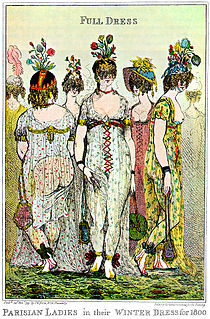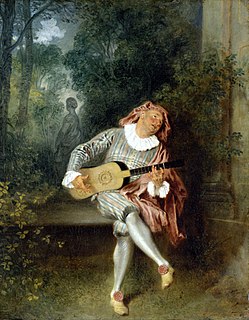
Frances Brooke was an English novelist, essayist, playwright and translator. Hers was the first English novel known to have been written in Canada.

Olympe de Gouges was a French playwright and political activist whose writings on women's rights and abolitionism reached a large audience in various countries. She began her career as a playwright in the early 1780s. As political tension rose in France, Olympe de Gouges became increasingly politically engaged. She became an outspoken advocate against the slave trade in the French colonies in 1788. At the same time, she began writing political pamphlets. In her Declaration of the Rights of Woman and of the Female Citizen (1791), she challenged the practice of male authority and the notion of male-female inequality. She was executed by guillotine during the Reign of Terror (1793–1794) for attacking the regime of the Revolutionary government and for her association with the Girondists.

Jeanne Françoise Julie Adélaïde Récamier, known as Juliette, was a French socialite whose salon drew people from the leading literary and political circles of early 19th-century Paris. As an icon of neoclassicism, Récamier cultivated a public persona as a great beauty, and her fame quickly spread across Europe. She befriended many intellectuals, sat for the finest artists of the age, and spurned an offer of marriage from Prince Augustus of Prussia.

Jean-Honoré Fragonard was a French painter and printmaker whose late Rococo manner was distinguished by remarkable facility, exuberance, and hedonism. One of the most prolific artists active in the last decades of the Ancien Régime, Fragonard produced more than 550 paintings, of which only five are dated. Among his most popular works are genre paintings conveying an atmosphere of intimacy and veiled eroticism.

Monique Wittig was a French author, philosopher and feminist theorist who wrote about overcoming socially enforced gender roles and who coined the phrase "heterosexual contract". She published her first novel, L'Opoponax, in 1964. Her second novel, Les Guérillères (1969), was a landmark in lesbian feminism.

Charles Théveneau de Morande (1741–1805) was a gutter journalist, blackmailer and French spy who lived in London in the 18th century.
The sentimental novel or the novel of sensibility is an 18th-century literary genre which celebrates the emotional and intellectual concepts of sentiment, sentimentalism, and sensibility. Sentimentalism, which is to be distinguished from sensibility, was a fashion in both poetry and prose fiction beginning in the eighteenth century in reaction to the rationalism of the Augustan Age.

Count Georges Vacher de Lapouge was a French anthropologist and a theoretician of eugenics and racialism. He is known as the founder of anthroposociology, the anthropological and sociological study of race as a means of establishing the superiority of certain peoples.
Thomas Pavel is a literary theorist, critic, and novelist currently teaching at the University of Chicago.

The Incroyables and their female counterparts, the Merveilleuses, were members of a fashionable aristocratic subculture in Paris during the French Directory (1795–1799). Whether as catharsis or in a need to reconnect with other survivors of the Reign of Terror, they greeted the new regime with an outbreak of luxury, decadence, and even silliness. They held hundreds of balls and started fashion trends in clothing and mannerisms that today seem exaggerated, affected, or even effete. They were also mockingly called "incoyable" or "meveilleuse", without the letter R, reflecting their upper class accent in which that letter was lightly pronounced, almost inaudibly. When this period ended, society took a more sober and modest turn.

A novel is a relatively long work of narrative fiction, typically written in prose and published as a book. The present English word for a long work of prose fiction derives from the Italian: novella for "new", "news", or "short story of something new", itself from the Latin: novella, a singular noun use of the neuter plural of novellus, diminutive of novus, meaning "new". Some novelists, including Nathaniel Hawthorne, Herman Melville, Ann Radcliffe, John Cowper Powys, preferred the term "romance" to describe their novels.

Jay Clayton is an American literary critic who is known for his pioneering work on the relationship between nineteenth-century culture and postmodernism. He has published influential works on Romanticism and the novel, Neo-Victorian literature, steampunk, hypertext fiction, online games, contemporary American fiction, technology in literature, and genetics in literature and film. He is the William R. Kenan, Jr. Professor of English and Director of the Curb Center for Art, Enterprise, and Public Policy at Vanderbilt University.
Ralph Alexander Leigh was a modern languages scholar, Fellow of Trinity College, Cambridge, and Professor of French in the University of Cambridge from 1973 to 1982, later Sandars Reader in Bibliography, in 1986–87. He specialized in the work of Jean-Jacques Rousseau.
Arthur Goldhammer is an American academic and translator.

Marie Geneviève Charlotte Thiroux d'Arconville, was a French novelist, translator and chemist who is known for her study on putrefaction. She discussed her study on putrefaction in her Essay on the History of Putrefaction in 1766.

Journal of My Life is an autobiography by Jacques-Louis Ménétra, an eighteenth-century master glazier in Paris. Begun in 1764, when Ménétra returned from a journeyman's tour of the French provinces, Ménétra's text intersperses accounts of his life on the road and in Paris with tall tales, braggadocio, jokes, and accounts of his seductions and pranks. In the words of historian Robert Darnton, Ménétra's narrative "restores the human dimension to the study of social conditions and brings flesh and blood to lifeless sociological categories. What we can finally see, with the help of these memoirs, is ordinary, everyday life."

Kirsten Saxton is a Professor of English at Mills College in Oakland, California where she is also the director of the MA of English.

Jean de Jullienne was a French textile manufacturer, art collector, and amateur engraver, best remembered as a friend and protector of the painter Antoine Watteau. He was born and died in Paris.

Mezzetino is an oil on canvas painting in the Metropolitan Museum of Art, New York, by the French Rococo painter Jean-Antoine Watteau. Dated within 1717–1720, Mezzetino forms a full-length single-figure composition, depicting the eponymous character in commedia dell'arte. In the 18th century, Mezzetino was owned by Jean de Jullienne, the friend and patron of Watteau who supervised the four-volume edition of prints after the artist's works, for which the picture was engraved by Benoit Audran the Elder; after Jullienne's death in 1766, it was acquired for the Hermitage in Saint Petersburg, then recently established by Empress Catherine II of Russia. During the Soviet sales in the 1920s and 1930s, Mezzetino was sold to British-American businessman Calouste Gulbenkian; it was later sold to the Wildenstein art firm in Paris and New York, from which it was bought in 1934 by the Metropolitan Museum of Art, where it remains; the institution also owns a preparatory study—a drawing of the man's head.
Events from the year 1669 in France














